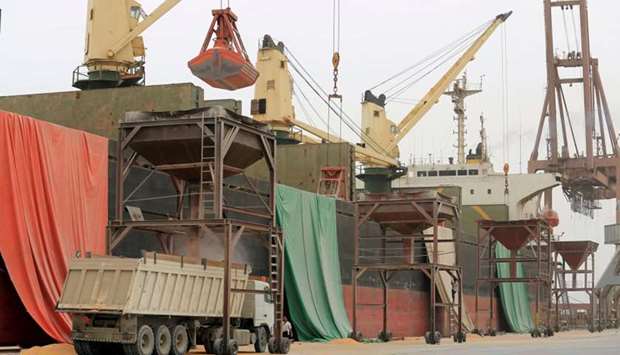After a night of air strikes on Yemen's Hodeidah, calm descended to allow hungry families to stock up on food in the Houthi-held Red Sea port city on Tuesday.
Saudi-led coalition warplanes had resumed air strikes late on Monday despite a lull in street battles between Iranian-aligned Houthi insurgents and coalition forces which had trapped families and endangered hospitals.
World Food programme (WFP) executive director David Beasley arrived in Yemen on Sunday to assess food security in the impoverished Arab country that has been pushed to the brink of famine by more than three years of war.
He visited a school in Hodeidah on Tuesday to oversee the distribution of food coupons which allow families to obtain a basket containing flour, sugar, milk, oil and canned beans.
"Thank God there is calm and security today. We went out to buy things for the house without fear," said Fattoum Ahmad, a housewife and a resident of Hodeidah city. "There were no explosions or gunfire. I wish the war would not resume."
It was unclear if the fighting stopped because of Beasley's visit and whether the U.N. coordinated with the Saudi-led coalition.
The Sunni Muslim alliance led by Saudi Arabia and the United Arab Emirates renewed its offensive on Hodeidah, a lifeline for millions of Yemenis, as Washington and London called for a ceasefire amid renewed U.N.-led peace efforts.
The international community fears that an attack on Hodeidah port would disrupt its operations and endanger millions of civilians as it remains the main source of Yemen's food imports as well as humanitarian aid.
An air strike hit the port's entrance on Monday and killed three guards, a witness and Houthi media said.
The WFP is still unable to access grain silos containing 51,000 tonnes of wheat which were seized by coalition forces during the fighting, spokesman Herve Verhoosel said on Tuesday.
Verhoosel, speaking in Geneva, said those supplies could feed 3.7 million people in northern and central Yemen for a month.
The WFP said last week it plans to double its food assistance programme for Yemen, aiming to reach up to 14 million people "to avert mass starvation".
The coalition has said that wresting control of Hodeidah would break the Houthis by cutting off their main supply line and force the group to the negotiating table to end the conflict, seen as a proxy war between Riyadh and Iran.
The coalition abandoned a previous offensive on Hodeidah last June without any gains amid international concern over a humanitarian catastrophe to give peace talks a chance.
The alliance, which relies on the West for arms and intelligence, intervened in Yemen's war in 2015 to restore the internationally recognised government ousted by the Houthis, who control Yemen's most populated areas and the capital Sanaa.

A shipment of grain is unloaded at the Red Sea port of Hodeidah, Yemen on August 5, 2018
